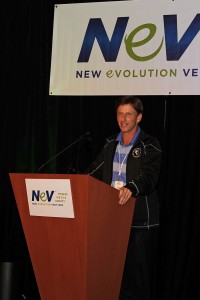 The name Mark Mastrov resonates loudly throughout the entire fitness industry. There probably isn’t a single club owner that hasn’t heard of Mastrov and his success. However, the real Mark Mastrov isn’t just one person.
The name Mark Mastrov resonates loudly throughout the entire fitness industry. There probably isn’t a single club owner that hasn’t heard of Mastrov and his success. However, the real Mark Mastrov isn’t just one person.
Although, Mastrov grew up the same as everyone else, the Northern California native didn’t reach success as that initial person. At some point, we can slightly attribute to his early 20s, Mastrov separated from a single entity and became a multitude of different people, all wise in their own regard.
Deep, right? Well, Mastrov wouldn’t argue with that description. In fact, he would say that probably describes his life more than anything else — a team of people working for one common goal — to create the greatest fitness facilities on the planet, serving their markets and communities.
In creating New Evolution Ventures (NeV), Mastrov continued with several of the entities that comprised his success. Two main factors, Jim Rowley and Mike Feeney, both counterparts at 24 Hour Fitness, are two of the many legs that support the NeV brand. And, although, NeV is relatively new to the fitness scene per se, it’s these three men, committed to one successful venture, that are revolutionizing the fitness industry once again.
Mastrov, 53, said he never thought he would have the success he has had in the fitness industry. For him, he simply followed a path that lead to success and never faltered or changed course.
Immediately following college, Mastrov landed a job with his business degree. The job was giving him what he needed at the time, and he wasn’t actually looking for something new. “There was no particular desire or thought process as to getting involved in the fitness industry in the mid 80s,” Mastrov explained. “I came out of college; I had injured my knee playing sports, and was committed to keep it in shape through exercise and lifting weights, exercises I had learned in rehab.”
A little gym opened right around the corner from where Mastrov was living at the time. “A buddy of mine was working there and he convinced me to come in and join, so I went down, and they had a lot of equipment, the Nautilus equipment, that I had used in rehab,” he said. “When I got to the gym, they had a full line of Nautilus and I knew how to use it. The owner of the gym at the time approached me to see if I would be willing to come work for him. He said if I put in four to eight hours a week he’d give me a free membership, which sounded good. I signed on to work, I think Wednesdays, six to 10, after my other job.”
As time progressed, Mastrov’s desire to work in a gym grew. He realized that he could do more, working in a gym, than he ever could at other companies. “What I liked about the industry was it allowed me to do a little bit of everything in the world of business,” he said. “Our business is interesting, it’s a service business, but is driven by sales and marketing performance. So, you’ve got to be strong at your sales and marketing approach, and you have to be even better at servicing your team and members in order to retain them. In addition, you get to do a little bit of everything from accounting and finance, construction and development to marketing and operations, all the way across the board, just about everything a business needs to do. Every day is different, has its new challenges and you’re interacting with people from all walks of life.”
In the beginning, Mastrov believed the key to owning a great club was sales based. But, all that quickly changed. “You had to pay the bills, and in the very beginning electronic fund transfers and monthly dues that make this kind of a predictable business with the reoccurring revenue base didn’t exist. Every month you had to start over so to speak in order to pay the bills, and then EFT came along and the business changed for the better.”
Mastrov’s ability to think out of the box started the model of putting people on monthly billing transfers which eventually took over and reshaped the business aspect of owning a club. “It made the business so much better,” Mastrov said. “Monthly dues via electronic funds transfer — EFT as we called it — allowed consumers to join without having to pay everything up front. They could pay monthly instead of annually which put the pressure on you and your team to perform. So you began to direct your attention on your service model. You had to have a great offering, and focus on your competitive advantages in the market place. For example, how strong was your service team? How good were your outreach and sales programs? How member centric was your physical plant and facility design, and so on.”
As he grew more infatuated with the fitness industry, he felt the desire to leave his other company altogether and pursue a career in fitness. “My mom and dad were supportive, they thought I was a little crazy and they said, ‘look, do what you want to do, you went to college, you have a great degree, you have another job that seems very stable, but to go be a gym manager, Wow! If that’s what you want to do, we support you 100 percent.’ But, in the back of their minds I’m sure they thought I was off my rocker at the time.”
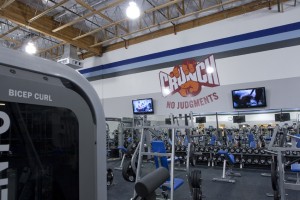
Mastrov found himself going to the woman in his family that understood the passion of an entrepreneur — his grandmother. “I went to borrow some money from my grandmother and she was really good about it,” he explained. “She thought it was great that I was looking to get involved in my own business. My grandfather, who had passed away when I was 8 was very entrepreneurial, so she was excited and very open to let me borrow a little bit of money. I borrowed $15,000 from her to invest in the gym. If I think back about it, she was really supportive and very generous and excited for me.”
Clearly, his grandmother’s investment turned out to pay back. As Mastrov became more and more proficient within the industry, it definitely produced a return on investment. Every ounce of hard work brought in more revenue, which allowed him to acquire additional clubs under the banner 24 Hour Nautilus.
As 24 Hour Nautilus grew, the team grew, eventually bringing on the likes of Mike Feeney and Jim Rowley, along with many others like Don Harbich, John Romeo, Gil Freeman and Tony Bakos. 24 Hour grew and eventually acquired Family Fitness Centers — another major chain throughout California founded by the legendary Ray Wilson. The acquisition converted 24 Hour Nautilus to 24 Hour Fitness, the company that it is today.
As Mastrov led the company to expansion around the world, his team members, Feeney and Rowley, were becoming more and more involved with the fitness industry. By the late 1990s, Mastrov had positioned 24 Hour Fitness as the largest fitness club chain in the world.
Mastrov believed in fitness and the industry. As his clubs grew, Mastrov became more focused on the member. Operating a club was much more complicated in the past without a standard system for running a club and making members happy. “[Running a club] is much more professional now than it ever was,” Mastrov explained. “I think that we’ve matured as an industry, and while there is still innovation within the industry there is a core competency, that has been built around the way to operate facilities. It’s a lot easier than it once was, and I think you’re seeing that now as more and more brands and franchises are being developed than ever before.”
However, the major key for a successful operation — where the success begins — is having the right players in place to win the game. This is where Mastrov brought in people like Mike Feeney, 49, and Jim Rowley, 44 — two team members that have helped perpetuate the Mastrov success formula for nearly two decades.
The success that the team had at 24 Hour Fitness can never be overlooked. They created a worldwide brand through hard work and determination. They helped build a brand that has tested time and come out on top. Why? Mastrov and his team are go-getters. They have the determination to start companies from the ground up, and nurture them until they are successful — international business is a common term when discussing Mastrov. So, it was no surprise that Mastrov, Rowley and Feeney didn’t waste any time in building a new company after stepping down at 24 Hour Fitness in 2008. By the end of that summer New Evolution Ventures — the next world-dominating fitness company — was built with their idea to become a global business, run by team members around the world.
Although Mastrov, chairman and co-founder, has been known for years as a successful fitness industry mogul, it wasn’t him alone that created the power company NeV. With Rowley, CEO and co-founder, and Feeney, EVP design, construction and co-founder, they developed a flawless team that functions like a family, to create another global brand.
However, NeV doesn’t function like other major fitness companies. It doesn’t rely on the success of NeV as a brand, but it concentrates on many smaller brands encompassed by NeV — such as, Crunch, UFC Gyms, Hard Candy, Energy Fitness, YogaWorks, California Fitness & Yoga Centers, V Club, barre3, Mrs. Sporty, Planet Fitness Russia and Steve Nash Fitness World & Sports Club among others.
The list of clubs itself is breathtaking. Mastrov said the best thing about the entire venture isn’t the amount of clubs or their locations around the world, but the team and how they work together.
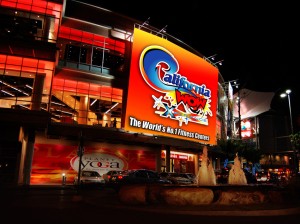
One example of the team working as one, regardless of club brand, is Selena Short who runs NeV’s business in Australia. “She’s an incredible operator and a very creative marketing person,” Mastrov said. “She always has strong ideas and concepts. She’ll develop an idea that none of us have tried before, and we will then share it with our whole global community and the concept will grow.”
Following Short releasing her ideas to the business team, NeV uses an in-house developed Intranet site to relay that concept around the world and implement it in other clubs.
Developing clubs in Russia created a similar situation as it did everywhere around the world. “As you get into the international markets it’s a totally different game, much more challenging,” Mastrov explained. “You have to have a very strong local partner that you have a good relationship with and a lot of trust — then you need to empower them on a daily basis to make decisions in those markets. You’ll often deploy your operating model into the market, then adjust it 20 percent to help fit the local culture. Then, you have to go to work and let the fun begin by dealing with the issues in real estate development, construction management, back office systems, etc. Many of those systems of course don’t exist in foreign languages. There lies the challenge, building what you know in a market where you most likely don’t speak the language, let alone understand the culture and real estate.
“In Russia still today, there is no electronic funds transfer, so there are no monthly dues, it’s all cash business. I think what you start to learn in foreign markets is a deep appreciation for having the ability to adjust your operating model into the given market and finding what the new model for success is going to be. Then developing and training people like you did 20 or 30 years ago all over again. Why? Because when you enter a new market, such as Russia, or South America or Asia, you find there are no personal training systems or certifications. And Group X is something that is very new; there are no large certification forces to develop Group X personnel let alone consumers who have belonged to a fitness center before.”
In different markets, just getting people motivated varies. Mastrov said that in some countries he found it easier to get people exercising in a club, than in others. “In Russia it wasn’t very difficult,” he said. “People there are very oriented to sport, so they loved exercise. What’s interesting is when they got on the treadmill they put on the highest button, level 20 or whatever the equipment ran at, and they ran at that level until they were exhausted or they had to jump off. They were very competitive.
“The same experience we had in Germany. The people there are sports oriented and very aggressive when it comes to exercise. Flipping over to Asia, it was very new and very social, along the lines of what we saw in the U.S. in the 80s. People joined because their friends joined and they got to meet and hangout, have fun and exercise. But, there, they weren’t really into the machines and the equipment as much as you might expect. Often, you’d find people running on a treadmill in Asia, in their first experience, but they never turned it on, they didn’t know how to use it. So, you spend a lot of time educating, developing and working with your team and member base.
“Fast-forward 10 years later and it transformed into the same thing you saw in the states. If you walked into a gym, you could tell they had been lifting weights. They had muscle mass, their Group X had exploded and slowly it developed along the same lines it did in the U.S. over a 10 to 15 year period. It became more about health and wellness than it did about social. I think we were part of the first group, Eric Levine and California Fitness then Mike Balfour and Fitness First, and then some great local Asian operators developed facilities in each country. You started to see more of an advancement we saw in the U.S.”
Reactions around the world were always different depending on whether the country was sports oriented or not. Regardless, what always helped Mastrov was his understanding of teamwork. He’s great at relationship building and understands how to utilize the strengths of each person. Of anyone, Rowley understands that relationship the best.
Rowley started on the sales staff at 24 Hour and proceeded to climb the ranks until Mastrov took notice of his passion and work ethic. This year marks 20 years Rowley has spent with Mastrov. “Of the 20, the first four to five years I didn’t have a strong personal relationship with Mark,” Rowley explained. “He was the CEO and the founder of the company and I was climbing the corporate ladder. Then, probably around year three or four he started to notice that I was performing well. Probably by year six he started to take a greater interest and so forth. By year 10 we had started to invest on deals outside of 24 Hour Fitness. We had that opportunity and he invited me in, so that’s when our relationship outside of 24 Hour Fitness really began.”
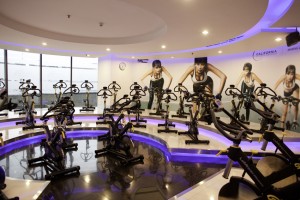
“I think he and I have a lot of yin and yang,” Rowley explained. “He offers a great vision, he can look further into the future and my capabilities are more in the now. I think I thrive on ascertaining what’s happening in the businesses and getting our young team members, our senior team members and our brands to perform. So, it works well for us that he looks a little further ahead and I try to stay in the now. Working for him for 17 years was great. Working with him since founding NeV together, has been the best three and a half years of my career.”
The difference in attributes of Rowley, Mastrov and Feeney is what has made NeV such a special place. It’s more than just a partnership or job. It’s a family that works together to create a product. The way they discuss each other’s decisions and processes, it makes one think of a small family owned business from back in the early 1900s. Each day, every individual brings a voice into the club or the office. They meet on the road in a multitude of countries and spend time contemplating what could be the next fun move — not the move that would take out the club across the street. However, don’t mistake their fun-filled attitude as not being focused on success. After almost 30 years, it wouldn’t be Mastrov if success weren’t involved.
“What makes players in the NFL want to play under coach Belichick,” Rowley questioned as he began to discuss why he chose to partner with Mastrov. “The guy’s a winner. I want to win the Super Bowl. I don’t want to make it to the playoffs, I want to win the Super Bowl and I expect to win it every year. I’m a competitor. I am a ‘put it all on the line, max out or black out competitor’ and I compete in business. I compete with myself, I compete with my team, I compete with other people in the industry and I want to win. Mark’s got a proven winning record. He’s been winning for two decades, and who would not want to associate with that?”
Feeney concurred with Rowley. “Along with my wife and kids, it’s the most rewarding 20 plus years I’ve had,” Feeney explained. “It’s been 20 years of somebody who trusts you 100 percent. And, when that happens, you tend to do everything possible to not let that person down.” Feeney joined Mastrov’s team at 24 Hour Nautilus in 1990 to ensure that each and every club is maintained.
Feeney is the partner that is continually in the club. He oversees a club from the ground up and ensures everything is in working order prior to, and after its opening. At NeV, he believes he is truly on a winning team.
“More than anything, the difference between our company and other companies — I don’t just mean in the fitness industry, but in any other industry — is that these guys care about the people, the employees and the members,” Feeney explained. “That’s a big difference, we believe in what we do and that care comes out.”
Mastrov uses the passions of his partners, both Rowley and Feeney, as well as the rest of NeV to succeed and ensure the collective teamwork of many sub brands under the NeV banner.
Learning from people helped launch one of the newest and most versatile clubs under the NeV banner — UFC Gym. Mastrov has been a UFC supporter for many years due to his lifelong enthusiasm for martial arts. He first experienced UFC at UFC 3 in 1994.
“I’ve been a big fan of UFC, I’ve been going to fights since the early days,” Mastrov said. “I’ve attended many events and I know Dana [White] (President of UFC) and have met Lorenzo [Fertitta](Chairman/CEO of UFC), and Frank [Fertitta](Chairman and CEO of Zuffa, LLC., an American sports promotion company) over the years. And, when I left 24, word got out and somehow they found out that I had left, so Lorenzo contacted me and asked if I would come take a meeting with them. So, I flew into Vegas and Lorenzo and I sat down and he started talking about this opportunity to develop a branded brick and mortar UFC Gym that would be different and unique to anything else that was in the market.”
“It’s something that my partners, Lorenzo Fertitta and Frank Fertitta, were considering for a while,” White said. “When we decided we wanted to pursue UFC Gyms, we knew we wanted to partner with the best in the business. Mark Mastrov and Jim Rowley were guys with a proven track record of success in the industry, and they had similar goals to ours. They are always looking for ways to raise the bar in the fitness industry and that’s exactly what our mission has been with UFC Gyms.”
“Within about two or three hours we had a handshake on a deal,” Mastrov said. “And, Lorenzo is a visionary, the guy’s just phenomenal — you throw in Dana, who to me is one of the greatest promoters in the sports game that anyone has ever seen before, and you have something pretty special.”
“Lorenzo and Dana both had a pretty strong opinion on what it should be, and if you have ever seen both of those guys, those guys are fitness enthusiasts, they both are ripped, shredded guys who train like crazy every day,” Mastrov continued. “They felt that the gym should be very family oriented, with kids. It wasn’t going to be around a bunch of MMA fighters, blasting it at each other. They wanted it to be aimed at community and very social. So we developed a unique offering around UFC that has become distinctive within the market that it operates in, and we are starting to grow it pretty aggressively.”
“With Mark’s insight on branding and developing fitness facilities, and our desire to continue to grow the UFC brand, it’s been a fun process,” White continued. “We want to give people access to the training techniques used by the best athletes in the world — mixed martial artists. We believe that we’re creating the ultimate fitness destination with our UFC Gyms. As we’ve gotten bigger and the UFC has taken off, we’ve tried to align ourselves with the best and brightest people to help us continue our growth. When it comes to fitness facilities, Mark is a proven leader.”
In the next five to 10 years, Mastrov has many of the same visions for Crunch as he had for 24 Hour Fitness in its early years. “The Crunch brand, led by Keith Worts is powerful, and our marketing team that Christina
DeGuardi leads is remarkable. When we look at Crunch today, versus where Crunch will be in five years, I think we will see a tremendous growth story. We would like Crunch to become one of the household names for fitness. It’s got strong recognition in the marketplace and while there are some well-known health and fitness brands out there, in every awareness test we’ve done, Crunch is perceived by people as one of the biggest in the industry, yet it’s still small. Our hope is, through the franchising and development of our own company-owned stores, to grow this to become a commanding machine with 300 to 400 store locations in the next five years.”
Aggressive expansion is something that Mastrov and Rowley discussed in detail about all their companies, but especially Crunch — led by Rowley as CEO. “One big opportunity for Crunch is in a low-cost play area,” Mastrov explained. “Our view was to take the Crunch brand and move it into the franchise market in order to explode and expand it very quickly. I think we put together a very special franchise program through Ben Midgley, who was formerly with us at 24 and at Planet Fitness. Ben has done an excellent job at developing the Crunch franchise program, making it very distinctive. With its unique appeal and the Crunch “No Judgments” platform, we started to roll out this franchise business in 2010. Our franchise partners have become extremely successful in a very short amount of time. We are excited to move into the suburban markets with this lower cost model, and believe we are extremely competitive in the way that it’s been developed. With over 100 locations sold in the first year, we are very excited about the future ahead.”
Mastrov has yet to slow down since his exodus from 24 Hour Fitness, a 20 plus year venture. Aside from meeting with Lorenzo and Dana about UFC Gyms, continually working with his business partners on other ventures, his goal has been to stay ahead of the curve. This also came with a phone call from Guy Oseary, Madonna’s business partner and manager. They had an idea to do something around health and fitness to perpetuate Madonna’s advocacy and lifelong pursuit of a healthy lifestyle.
“I got together with Madonna and had several meetings with her around creating a concept that would be different and compelling, I brought in Craig Pepin-Donat, who was one of my early partners at 24,” Mastrov said. “We developed this Hard Candy Fitness brand and have built the scenic offering that I think is going to become very powerful in years ahead.”
According to Rowley, it’s not so much the brands that have attracted the celebrities — instead, the celebrities have approached Mastrov about creating new and innovative fitness opportunities. People all around the world recognize Mastrov as a fitness guru that can make magic happen with clubs everywhere.
However, when speaking with Mastrov you don’t get the impression that he realizes the impact he’s had. Sure, he seems to have a never-ending bag of tricks, and he continually seems to philosophize on the future of the industry, but he’s not an egotistical persona that holds the knowledge of the fitness industry. He’s just a normal family man that enjoys spending time with his wife and kids, as well as working with his business family to spread fitness around the world in a creative way.
It’s hard to imagine where Mastrov may be in 10 years, because he doesn’t seem to know. He also doesn’t seem to worry much about it. Rowley said, when the two decided to develop NeV, their goal was to create a company where they could golf more than they would work. Since the development of NeV, Rowley and Mastrov have shared courses and greens around the world, but they have yet to reach the common goal of golfing at least two days a week.
Rowley shared his vision to eventually let Mastrov step back and just be a guiding voice for NeV. However, he doesn’t believe it will happen anytime soon. Mastrov, Rowley and Feeney, have too much fire and energy for the fitness industry to ever stop working — at least not anytime soon.
Over the past few years, there has been another generation hanging out around NeV. Mastrov and Rowley’s kids are in elementary and high school and can often be seen at the office. Feeney has a daughter who is now the chief of staff for NeV and a son in college who was recently a NeV intern. Linell Killus, the chief marketing officer for NeV, has a daughter whose position is an NeV business analyst And, Mastrov’s nephew, Brian Calegari, who has been with Mastrov for over a decade, runs social media.
According to Rowley, the shared belief in the future of NeV won’t rely on eventually selling off and moving on to another venture, but rather the passing of the torch. They believe NeV to be a family owned business. One where children of every employee dream of working under the NeV banner, either on the club level or on the business level all around the world — truly, a perfect family scenario and never ending fitness venture.-CS
By Tyler Montgomery



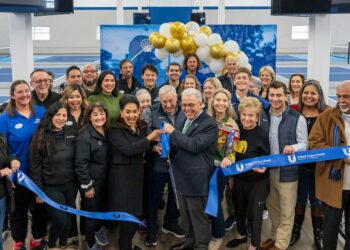





Comments 1